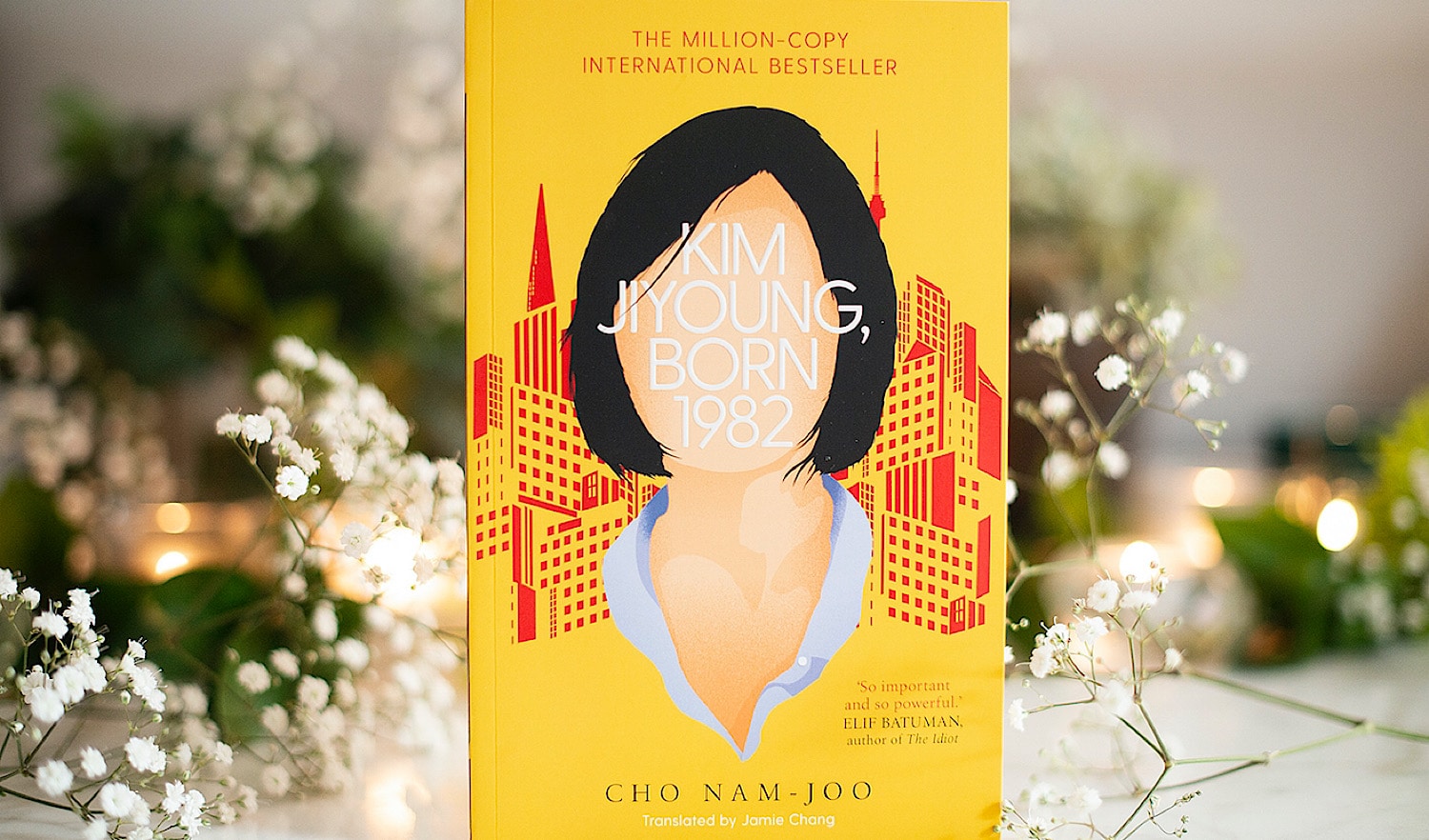BRIANNA HIRAMI WRITES — Cho Nam-Joo’s eye opening novel, Kim Jiyoung, Born 1982, displays how South Korea’s demoralizing rules and societal norms negatively affect the lives of Korean women. This straightforward novel wastes no time by jumping right into Kim Jiyoung’s, the protagonist’s, story about how sexism casually dictates the lives of most Korean women. This novel narrows in on the hard truths that women, including Jiyoung, must face regarding cases of sexual assault, unfair sexism, familial pressures placed upon women, and a loss of self-identity.
Throughout all stages of her life, Kim Jiyoung has endured countless demeaning critiques, from both men and women, that have positioned her status as lower than men. From blood relatives scolding her for sharing her younger brother’s food, to sexist employers viewing her as an incompetent and unreliable worker, and even random strangers calling her a “lazy mother,” Jiyoung has greatly suffered from Korea’s brutal patriarchy. The reader can rightfully assume that societal pressures led to the collapse of Jiyoung’s mental health, and at the end of the novel, she falls victim to psychosis.
Kim Jiyoung, Born 1982, is Cho Nam-Joo’s most successful novel due to her palpable honesty surrounding the uncomfortable and gut wrenching reality of Korea’s patriarchy. With over a million copies sold, Nam-Joo’s famous novel has finally been translated into English four years after being released in South Korea, and months after the film adaptation. Even though this novel has only been translated into English once, English-speaking readers have been raving about the raw and terrible experiences that leads to Jiyoung’s downfall and the collapse of her sanity. This novel captivates the heart of Koreans because of its accurate portrayal of the real pain and suffering Korean women have been dealing with for generations. The only translator for the English version of the novel, Jamie Chang, has translated other Korean novels like The Summer by Choi Eunyoung. Chang states that Kim Jiyoung: Born in 1982 is not just describing the perspective of one woman but covers the experience of many Korean women. Even though this is a fiction novel, Nam-Joo notes that Jiyoung’s story is not much different from her own and is filled with real statistics and stories about the gender inequality.
From a young age, Kim Jiyoung has suffered through the effects of Korea’s misogynistic society. This novel travels through each major stage of Jiyoung’s life, leading up to her psychosis during adulthood. The reader quickly sees that throughout her challenging childhood, Jiyoung’s own grandma constantly belittled her importance in the family in comparison to her younger brother. This can be seen through one of Jiyoung’s first childhood memories when her grandma scolded her for eating her younger brother’s baby formula. Her grandma was upset not because she was eating baby formula, but because she was “stealing” her younger brother’s food. Jiyoung expressed feeling that her grandma overtly prioritized her grandson’s happiness and health over that of her and her sisters. This painful sentiment is emphasized by the line,
“Her grandson and his things were valuable and to be cherished; she wasn’t going to let just anybody touch them, and Jiyoung ranked below this ‘anybody’.”
Since adolescence, Jiyoung discerned that there exists a vast difference in the way men and women are treated in Korea. Nowadays, children always joke with their parents saying that they are the favorite child above their siblings. However, for Jiyoung, there was no joking about favoritism in the family. She already knew the answer.
Throughout her life, Jiyoung endures many cases of sexual assault and discrimination as a worker. While Jiyoung was attending school, there were many male teachers who sexually assaulted young girls like her without facing any consequences. Jiyoung even states that one of her male high school teachers inappropriately touched female students in class using a pointer stick,
“…[he] carried around a pointer that had a hand pointing just the index finger on the tip, which he used to poke girls in the breast under the guise of drawing attention to missing nametags, or to lift girls’ skirts to “check their school uniform.”’
This line demonstrates how, even from a young age, girls are programed to tolerate sexual harassment from men. This normalization of sexual assault among Korean women has led men to not be held accountable for the mental and physical torment that these women must battle.

Oftentimes when women complain about being sexually harassed, the blame either falls upon the woman or society is often guilt-tripped to “feel bad” for guilty men.
At Jiyoung’s old job, her past coworker told her the horrific story of a hidden spy camera in the ladies’ room. Male coworkers were casually passing around naked photographs of their female colleagues to each other without their consent or knowledge. Once this scandal was brought to the attention of everyone at the company, and justice was being demanded, instead of holding the male employees accountable for their actions and rightfully punishing them, the company’s male director tried to brush away the case quietly and quickly. Jiyoung states that he even tries to gain sympathy from others for the male employees,
“It’ll ruin this company’s reputation if word gets around in the field. The accused male employees have families and parents to protect, too. Do you really want to destroy people’s lives like this? Do you want people to find out that your pictures are out there?”
The reader can again bear witness that there is a complete lack of accountability from men in Korea to act justly. A woman’s mental health and well-being are constantly being treated as disposable and insignificant in comparison to a man’s success and reputation.
When Jiyoung graduates from college and begins to search for jobs, she instantly notices Korea’s toxic workspace that highly favors male employees and often looks down upon female candidates. Not only are Korean women paid significantly less than Korea men, but they are often seen as an inconvenience to the company. Maternity leave and motherly responsibilities are viewed as a “cost” to the company, which is why many companies avoid hiring women. Jiyoung also describes how she overheard a story about a well-qualified female candidate who held all the requirements of her dream job. The company refused to interview her, and when questioned on why she was not chosen as a candidate, he answered that it was because he prefers to have male employees and that he also finds smart women “taxing”.
In Jiyoung’s own personal experience with her first job, her male colleagues were given the more difficult tasks of being on the planning team, even though they had the same qualifications and were hired at the same time. Jiyoung finds out that the reasoning behind this unfair treatment is because the planning team is a long-term project, and the head of the company assumes that many women employees become pregnant and must take time off to care for their children. Jiyoung was not even given the opportunity to achieve this higher position because her future was already decided for her. Her role as a mother was already assumed, and she did not even receive the chance to accept or deny the possible job opportunity.
South Korea holds Korean women to an extremely strict standard over their expected maternity. Once she and her husband get married, Jiyoung’s in-laws intensely question why she and her husband have not produced any children yet. They continuously pressure Jiyoung to have children, especially a son, despite her having many doubts on if she is ready to have a child yet. Despite Jiyoung thoroughly enjoying her job, and making additional money, societal expectations dictate that it is her responsibility to raise her child and take care of the home while her husband works. Once Jiyoung becomes pregnant, she quits her job and faces the hypocrisy and degradation that many Korean mothers endure during and after their pregnancies. Jiyoung discovers that many pregnant Korean mothers are treated inhumanely for being pregnant, even though it is what society expects from them. During Jiyoung’s pregnancy, she was heading to work on the subway and had encountered a female college student who reluctantly gave up her seat for Jiyoung. The encounter was made more vicious when,
“[The stranger] knocked into Jiyoung’s shoulder and pushed past her, she said loud enough for Jiyoung to hear, ‘About to pop and still taking the tube to go make money-clearly can’t afford a kid”’
Once Jiyoung had her daughter, she faced even more unfair abuse from strangers who judged her for being a mother. When Jiyoung was pushing her daughter in a stroller one day and stopped to sit on the bench to relax and enjoy her coffee, Jiyoung overhead a group of office workers saying horrific things about her. They called her a “mom-roach” and claimed that her life was “so easy” since she could live off her husband’s paycheck, and that they were never going to marry a Korean woman.
Korean society has ingrained the notion that women must become mothers, while taking care of the household, or else they are seen as useless and damaged. However, once they fulfill this rigid expectation, they receive hate and humiliation for doing the “job” that they have been pressured to do for their entire lives. This novel proves how Korean women are unable to live a peaceful life without societal pressures damaging their mental health. That is exactly what happens to Kim Jiyoung – the pressures of Korea’s insanely strict and hypocritical lifestyle drove her to absolute insanity.

New book reviewer, Brianna Hirami, is a recent graduate of Loyola Marymount University with a major in English and a minor in Asian and Pacific Studies. Brianna will continue following her passion in English and attend LMU again to receive her Master’s in Literature. She is interested in learning more about Asian culture by reading literature that is set in Korea and learning to speak Japanese.

